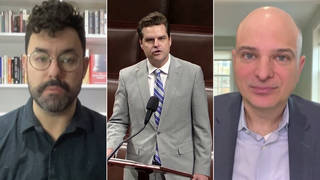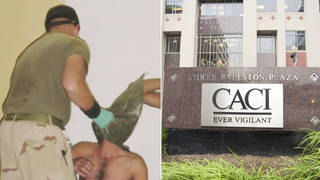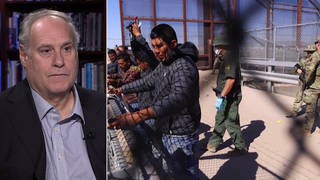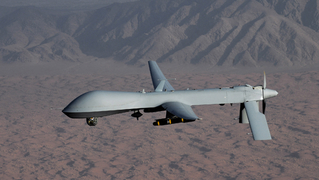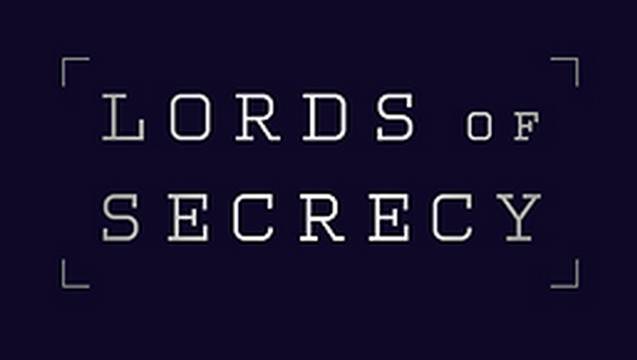
Related
Topics
Note: On Monday journalist and attorney Scott Horton joined us to discuss his new book “Lords of Secrecy: The National Security Elite and America’s Stealth Foreign Policy.” To watch or listen to the interview, click here.
Chapter 1: Battling for Democracy
By Scott Horton
(Excerpted from Lords of Secrecy: The National Security Elite and America’s Stealth Foreign Policy. Copyright © 2015 by Scott Horton. Reprinted by permission of Nation Books. All Rights Reserved)
“Though it may be true that, at least in history, values, be they of a nation or of humanity as a whole, do not survive unless we fight for them, neither combat (nor force) can alone sufice to justify them. Rather it must be the other way: the fight must be justified and guided by those values. We must fight for the truth and we must take care not to kill it with the very weapons we use in its defense; it is at this doubled price that we must pay in order that our words assume once more their proper power.” —Albert Camus
IN 2011, already fighting three wars in the Middle East, America decided to open military operations in Moammar Qaddafi’s Libya. The move was opposed by the leaders of the professional military, the secretary of defense, and the director of central intelligence. But other leaders of the national security team, led by Secretary of State Hillary Clinton, UN ambassador Susan Rice, and presidential adviser Samantha Power, supported the concept.
The decision to commit American forces was taken suddenly and engendered relatively modest public discussion. President Obama made no dramatic televised speech to the nation from the Oval Office—departing from a long-standing custom of modern presidents whenever American service personnel were sent into conflict, or even when a single strike was launched against some nation. The House of Representatives held hearings on the Libyan operations, but no legislation or resolution was voted either approving or disapproving the president’s decision. The trigger dates for wind-down and withdrawal under the war powers resolution came and went, and that statute—in which Congress granted the president some latitude to take military action abroad in exchange for presidential reports which would trigger a need for congressional approval—was essentially ignored. The president’s lawyers in the Justice Department dutifully issued him an opinion: he had the power to commit the American military to the Libyan operation because it was apparently not what the framers meant by “war” nor what Congress meant by “hostilities.”
The operation launched against Qaddafi had been approved by the UN Security Council for purposes of protecting the civilian populace from an impending massacre at the hands of their arguably unstable dictator. American, French, and British forces together with other allies were, in theory, engaged in a protective operation. Their military activities, however, soon grew and turned to the offensive: President Obama had determined that the only way to protect the Libyans was to overthrow their government—regime change.
The Libyan operations were broadly popular at first and enjoyed the support of key national security elites. Liberal interventionists like Rice and Power joined with neoconservatives like Charles Krauthammer and William Kristol in advocating the quick use of military force to stop a potential humanitarian disaster (and remove a despised dictator). Critical voices were barely heard, and those questioning the process were mostly constitutional law scholars. Americans generally seemed happy to let President Obama make the call and did not worry about the diminished role of Congress and the public in the decision.
Contrast these facts with the situation forty years earlier. America was sharply divided over the lingering war in Indochina. It overshadowed the 1968 and 1972 presidential elections and influenced many congressional races. Hundreds of thousands of Americans, mostly the young, took to the streets to protest the war effort. Fringe groups bombed draft boards. America faced a sharp cultural divide, and attitudes toward the prosecution of a foreign war seemed to be at the heart of the division. Congress probed and conducted hearings filled with pointed criticism; measures were introduced to defund or cut back aspects of the military effort; legislation sought to wrest control over war making back from the executive.
There are also marked dissimilarities between the two wars: their ideological background, the scope of commitment and time consumed in the effort, the risk to young American service personnel. But focus for a minute on the question of process. In the late 1960s and early 1970s, Americans at all levels were deeply engaged in the issue of war. It mattered to them, and it strongly influenced their conduct as voters and participants in a political system. This was equally true whether they opposed the war as something rash and unethical or supported it as part of a twilight struggle against the forces of global communism. But a decade into a new century, American political consciousness had shifted radically; both the public and its representatives in Congress were paying far less attention to the new war.
As a fourth military front was opened, military efforts in Iraq and Afghanistan continued despite sagging popular support, enabled by a prevailing sense of indifference. The third theater of conflict, a drone war maintained by America’s intelligence services in far-flung areas such as northwestern Pakistan, Yemen, and Somalia, was cloaked in mystery, with official Washington denying its very existence. A president overruled his senior military advisers—troubled by the fatigue and exhaustion of their overextended forces—to pursue it. Yet the decision to enter into hostilities in Libya drew a collective shrug from American voters. This contrast shows how issues surrounding the use of force abroad are fading from our nation’s democratic agenda.
This is not uniformly the case, however. Twice in the last generation, the nation went to war against Iraq. The first war followed Iraq’s invasion and occupation of Kuwait. President George H.W. Bush led America in a large alliance aimed at liberating Kuwait and restoring its government. The Gulf War of 1990–1991, now more frequently called the First Iraq War, had been launched with significant internal deliberation within the executive branch and following extended consultation with Congress. Dramatic televised debates occurred in both houses as the case for and against going to war in the Gulf was fully vetted and votes were taken. Around the country, hundreds of thousands of Americans gathered to express their views about the planned military campaign—almost all of them opposed—while public opinion showed that the population was closely divided on the issue.
There was a measure of friction between the executive and Congress just the same. Congressional leaders had challenged Bush Senior’s war plans, insisting that a military expedition to retake Kuwait could not proceed without the approval of Congress. At the same time, rumblings from the advocates of executive prerogative could also be heard. Dick Cheney, then secretary of defense, was outspoken in denying that President Bush needed a green light from anybody. The president, however, did not accept Cheney’s advice. On January 8, 1991, he asked Congress for an up-or-down vote on authority to launch Operation Desert Storm—driving Iraq out of Kuwait. The vote in Congress was close; in the end, Bush secured only fifty-two votes in the Senate but was granted the authority he sought. Thus this Gulf War was not to provide a testing ground for these divergent theories. To the contrary, it provided a solid example of going to war the old-fashioned way: with congressional debates, public demonstrations,
and televised Oval Office speeches.
The Second Iraq War was in some respects like the first one. A new President Bush was surrounded by many of the same advisers—Colin Powell, Dick Cheney, and Donald Rumsfeld—who supplied much of the same advice about his war-making powers. Although he may have been persuaded that he possessed unilateral war-making powers, in September 2002, the younger Bush sought a vote in Congress to explicitly authorize the Iraq invasion. Extended congressional debate followed, and American streets swelled with the largest demonstrations since the end of the Vietnam War. Finally Congress granted Bush what he sought—with a large majority of the Senate Democrats supporting the measure. Like the First Iraq War, the second proceeded through the familiar stages: presidential advocacy, congressional deliberation, public discussion, and an authorizing vote.
The two Iraq wars thus constitute outliers to the process to be discussed, even as we can trace the seeds of change within them. There are several likely reasons for this, but one stands out. Even the most zealous advocates of unilateral presidential war-making power are reluctant to commit to a long-term ground war likely to produce thousands of American casualties without some measure of democratic process. They will deny that this process is legally necessary, given their imperial reconstruction of the Constitution, but nonetheless they will urge the president to secure it.
Conflicts that involve lower-profile military engagement are managed by largely anonymous national security elites. Some of them stream across the media stage as talking heads. Others remain unknown to the public while influencing the figures in the executive who increasingly make all the decisions. This includes the nation’s national security elite—figures who occupy key decision- and policy-making positions in agencies charged with the nation’s defense, like the Pentagon, the CIA, the FBI, the Department of Homeland Security, and the NSA, which is emerging from obscurity as a result of scandalous disclosures—as well as dozens of others, particularly in the area of intelligence gathering and analysis.
I call these elites the lords of secrecy for several reasons. They are by and large the sources of secrecy, and they control, through classification powers, what the public is allowed to know. Increasingly they use secrecy to enhance their own power and authority, both in notorious intra-agency rivalries and at the expense of Congress and the public. Secrecy is highly corrosive to any democracy. When facts are declared secret, decisions that need to be made with knowledge of those facts are removed from the democratic process and transferred to the apex of the secrecy system, where only the lords of secrecy can influence them. What is properly public thus becomes the property of a private and secretive group who claim to hold a proxy for the public. The public may learn of neither the issue that has arisen nor the decisions taken, nor even the lethal steps deployed in their name.
As senator (and former Navy secretary) Jim Webb puts it, “Year by year, skirmish by skirmish, the role of the Congress in determining where the U.S. military would operate, and when the awesome power of our weapon systems would be unleashed, has diminished.” And the role of the American populace in this process has faded almost into oblivion.
This book holds no brief for any particular approach toward national security and foreign affairs. Rather, it focuses on the fundamental question of how national security decisions are managed in a democratic state on three levels—the public, Congress, and the executive. The president and his team will always be the implementers of policy, and history has consistently given them the key role as formulators of policy as well. But in questions of war and peace, America has been careful to ensure that the president’s power of initiative has been balanced with some form of congressional action. Congressional deliberation has, in turn, historically been moved to a great extent by public opinion—some voices calling for retribution or passionately assessing a threat to the country, others urging caution and warning that the costs associated with a war can rarely be forecast with any certainty nor the outcome known with any great assurance.
How does America go about making decisions on war and peace? Is this process evolving? Is our current process consistent with the vision of those who framed the American Constitution? Does it match our claim to be a democracy? The way a country goes about making vital decisions about its national security is a good sign of whether a country’s claims to be democratic are genuine.
Most nations around the world today make some pretense of democracy; it is now widely (outside of theocracies like Saudi Arabia and the Vatican) accepted as the only source of state legitimacy. Yet in most nominal democracies, the people have no say about whether their nation goes to war or makes peace. Are the people able to gather information and do they have a meaningful voice, whether through a formal or informal process? Or is war invariably presented as an unavoidable fait accompli by their leaders? Sometimes nations are attacked or invaded and war is thrust on them. These wars rarely prove controversial. A more difficult case exists with respect to wars of choice, when a nation can elect to start a war or not, often based on differing assessments of nonexistential threat, the costs, and the benefits imagined to flow from a war.
America has changed the way it makes fundamental national security choices over time, influenced by factors such as the modern technology of warfare, which collapses response times and puts a premium on the state’s ability to respond rapidly to perceived threats. But perhaps the most powerful factor driving change has been secrecy.
All governments use secrecy, particularly in connection with military and diplomatic dealings. The role of secrecy in America has accelerated steadily, first with the advent of nuclear technology, then with the commencement of the cold war, and finally—and almost inexplicably—after the cold war with a series of nonexistential threats involving modestly armed and organized terrorists. As we will see, secrecy has transformed both the way America wages war around the world and the way it shares information about threats and its own operations with the American people. Today Americans know less about what their national security forces are doing than ever before. And Americans frequently know less than citizens of other nations.
The consequence of this information blackout is that Americans also have less effective say about what their country does and what strategies and objectives it pursues. Decision-making authority has passed from the American people, the ultimate sovereign, and the Congress, the organ of oversight and balance, to the president and his unelected and essentially unaccountable advisers in the national security arena—the lords of secrecy.
———
Defining how an informed citizenry makes decisions about the country’s security is the central challenge of democracy in our age. And by this measure, American democracy is in trouble. For most of the republic’s history, whether to go to war or keep out was a question at the center of the nation’s political discourse. But after World War II, things started to change.
The challenge of atomic weapons and the cold war—an ideological struggle with foes who threatened the nation’s extinction—changed everything. America adapted by creating the national security state: permanent government structures addressing intelligence gathering, planning, and defense needs on a continuous basis during a time of quasi-peace. With the national security state came a new American elite: the national security expert and a vast bureaucratic apparatus. This apparatus in turn created an immense world of secrets: information so sensitive that only members of the elite have access to it. Secrecy is also used to justify disenfranchising citizens on national security issues: they can’t have classified information and therefore they can’t participate in critical decisions about war and peace; these matters are reserved for national security elites.
The architects of the national security state in the wake of World War II were concerned about the issues of democratic process that their new system presented. They envisioned legislative oversight as the key mechanism to balance the growing power and authority of the executive. They also viewed this as a springboard for public participation and information. This vision faced some significant institutional challenges—over time the national security apparatus expanded dramatically and the zeal and capacity of Congress to manage it shrank. National security elites were challenged to understand points of public interest and defuse them in a way that dampened public interest in national security issues and checked the press in taking a public voice in them.
This institutional drift can be understood most clearly as the product of the Vietnam era. In the period from 1964 to 1973, America engaged in its most unpopular foreign conflict of the modern age. Hundreds of thousands of Americans joined protest marches as sizable majorities of the American population opposed the war and questioned its wisdom. Discontent over the war fueled an immense counterculture that questioned and even ridiculed American values.
America’s national security elites felt vulnerable in the face of this movement, and a series of policies were formulated that served to buffer the national security decision-making process against public backlash. One was to introduce a volunteer army. The draft had been a lightning rod for opposition to the war. Protesters firebombed draft boards and burned draft cards. Inequities were highlighted as those with the means could evade service by obtaining education or family deferments (as did Dick Cheney) or by pulling strings to secure appointment to a “champagne unit” of the national guard as a low-risk service substitute (as did George W. Bush), while the sons of the working class and those from the fringe of society were more often called up. The fact that young men were forced to serve without their consent and faced criminal prosecution and imprisonment if they refused embittered many. Eliminating the draft removed much of the anger that powered opposition to military campaigns waged abroad; it
deflated public interest in national security issues generally.
A second policy strategy sought to develop low or even zero-casualty military technologies. This led to a focus on air war, the development of tactical missile technologies like cruise missiles and smart bombs, and robotic weapons systems such as drones. National security elites consider that the risk of physical harm to Americans legitimates and drives public concern and interest in foreign hostilities. So technological innovations that suppress such risks—now bringing them to zero—validate (in their view) the exclusion of both Congress and the public from decision making. This outrageously antidemocratic concept was formally ensconced in Department of Justice opinions supporting the president’s right to make unilateral decisions to use military force overseas without consulting Congress.
A third policy strategy involves reconfiguring forces deployed in combat settings. Over the past four administrations, America has witnessed a radical but seldom discussed transformation of the forces sent abroad to fight. Military contractors have figured in since the Revolutionary War, when boat-making contractors helped General Washington ferry his men across the Delaware. But historically their numbers have been fairly modest. By the time of the Afghanistan War, however, the number of civilian contractors deployed actually came to exceed the number of uniformed service personnel. National security elites assume that the American public is less concerned about the death or dismemberment of a contractor than of a serviceman or -woman. They also feel no particular compunction to collect or provide that information. The turn to contractors is justified as a cost-cutting measure, but there is no convincing evidence of that. To the contrary, available evidence suggests, unsurprisingly, that an ethos of profit rather than national service leads to consistently higher costs to the nation’s treasury.
One particular aspect of the new surge in military contracting presents a special challenge, the rise of private security companies (PSCs)—mercenaries, though the legal definition of the term is so narrowly drawn that almost any organization can navigate around it. These companies sell governments the ability to deploy quickly into hostile areas, use lethal force aggressively and without the limitations that the professional military is trained to respect, and do so in total secrecy.
Contractors are also private companies. They can shield their activities from congressional oversight by claiming business confidences. One of the most important benefits that PSCs sell is the ability to skirt the political concerns that surround a decision to send soldiers into harm’s way. Americans may well be concerned when their spouses, sons, and daughters are sent abroad to fight a war. Do they have the same concern when the risk and the brunt of conflict are managed by Academi (formerly named Blackwater) or Triple Canopy?
The world has now developed a $100 billion private security industry. Private security contractors can fill a gap that opens when a democratic government wants to deploy forces to some dangerous corner of the world but does not want to face questions from its population motivated by concern for the safety and well-being of young men (and increasingly also young women) in its armed forces. But heavy reliance on contractors rather than on troops may also enable national security elites to skirt the duty of public debate and democratic decision making surrounding complex foreign entanglements. It dilutes democracy further.
Generations of Americans were schooled in another adage: you can’t have both guns and butter—the population faces privations in wartime to meet the burden of the effort. There was a moral element to this—those at home should also suffer: war should be associated with pain for all. Their suffering would be financial. After all, the cost of wars should be borne by those who fight them. Otherwise, the nation is mortgaging its future—one generation is loading the burden of its political decisions on following generations.
This fact had obvious repercussions for democratic process. As the greatest conservative political theorist of the Anglo-Saxon world, Edmund Burke, once reasoned, the proponents of a war need to demonstrate that the foreseeable outcome of a war is sensible in terms of its cost. Some wars are existential in nature and the cost must be borne whatever it may be; others result when the nation is attacked. Still other wars are essentially wars of choice (though their proponents rarely acknowledge that fact). In this category, the cost element is important for democratic accountability—rulers who spend the nation’s treasure foolishly should suffer the consequences.
The cumulative effect of these developments—a volunteer military, robotic warfare, and private security contractors—does not remove the legitimacy of democratic interest in decisions about war and peace, because that is a basic element of sovereignty, which in America’s case has always rested in the people. But it does lower the interest of the American public in questions about going to war. There will always be pockets of interest: communities that are attached to foreign countries affected by strife, for instance; pacifists who instinctively oppose military intervention; industries that support and supply the military effort and those attached to them. But the experience of recent decades shows clearly that deeper and broader public interest in conflict—of the sort that accompanied wars in the period from World War II to Vietnam, for instance—is fading quickly. This may give the American executive in the twenty-first century broad latitude to engage in military campaigns.
That power may be exercised wisely. But we should ask the more fundamental question of whether this arrangement is consistent with what we mean by democracy today and what the founding fathers meant when our republic was launched. My object here is to probe what democracy means in the context of making decisions about war and peace, as well as to examine how this idea was developed in America and how the American process has evolved over time.
———
In the chapters that follow, I offer some analytical tools for understanding the role of citizen knowledge and public debate in a democratic society, the threat presented by secrecy, and some thoughts on how this menace has unfolded in American society in recent years, particularly in the post-atomic era. Chapter 2 looks back to the origins of democracy during the golden age of Athens and draws on democratic mythos and practice to consider the role played by national security decision making in the democratic process. I then chart how this concept of knowledge-based democracy has influenced political thought down to modern times, and the paths by which it came to influence America in the Age of Enlightenment.
Chapter 3 looks at the seminal contributions made by sociologists, starting with Max Weber and Georg Simmel and ending with Edward Shils and Daniel Patrick Moynihan, to our understanding of how secrecy has paralleled the rise of bureaucratic institutions and been used by bureaucrats as a tool supporting the accumulation of power and influence. I then apply theories advanced by sociologists to the conduct of national security elites in America over the past decade and demonstrate how these case studies vindicate the sociological theory of bureaucratic use of secrecy.
Chapter 4 charts the evolution of the national security state in America following the discovery of nuclear weapons and the recasting of the government during the cold war. I then track the birth and expansion of the lords of secrecy, the elite professional leadership of the national security apparatus, as an aspect of this evolution of political structures, and focus on how secrecy has been used to heighten their power and authority. I examine how these elites adapted to the trauma of the Vietnam War, in which their authority was systematically challenged, by identifying and acting against the major touchstones of public interest, starting with the elimination of the draft.
Chapter 5 considers the role played by war-making technologies in this process, and cites the armed Predator drone as the new weapon of choice among the lords of secrecy. I note the use of drones in connection with covert warfare by intelligence services as the national security state’s preferred strategy in the counterterrorism warfare of the last decade, and I highlight the fundamental policy issues for American democracy, particularly as the use of drones may trigger broader and more sustained warfare.
Chapter 6 looks at the conflict between whistleblowers and the lords of secrecy. I consider how whistleblowers undercut the position of national security elites and shine a light on their dubious activities, then challenge the government’s claims about its enforcement
measures and examine the tools that the national security state has honed to use against whistleblowers, as well as the viciousness of their application.
Chapter 7 looks at how the Obama administration decided to launch a military campaign in Libya in 2011, as well as its failed effort
to undertake a retaliatory mission against Syria in 2013. Both illustrate how Congress and the public are circumvented in national security decision making—and how the authority and control of the lords of secrecy are growing.
The last chapter explores the churning sea of secrets that is engulfing America today: the offspring of the rise of the lords of secrecy and the key to their power and influence. I then look at the legal edifice on which these developments are based and discuss approaches to rolling back the sea of secrets by forcing national security information that is essential to democratic discourse into the public domain, concluding with a useful role that Congress, the public, the media, academics, and whistleblowers can play in this process.

